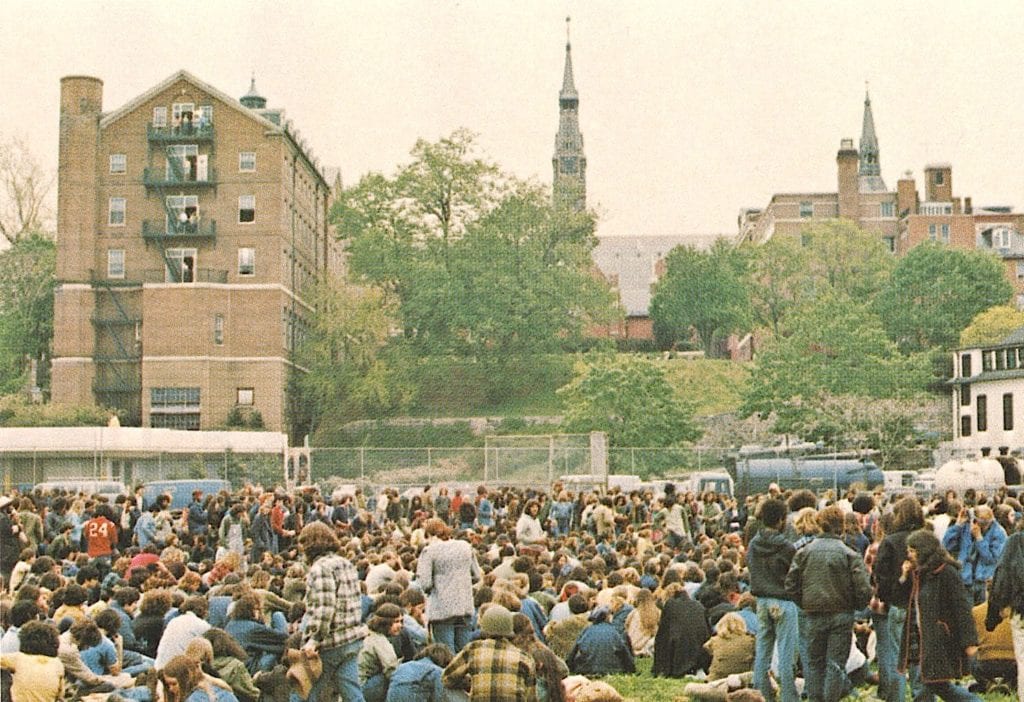May Day 1971: Its Before & After Effects
By • May 1, 2021 0 1246

It is hard to describe how horrible the Vietnam War was in 1971. It had been destroying America’s core principles, as the war was not only a mistake but was in fact illegal on so many levels. One must remember that the reason former Marine Daniel Ellsberg’s office was illegally broken into was to find documents that could be used to stop his releasing the Pentagon Papers. That was the beginning of Nixon’s “Plumbers” — to stop’ leaks’ that would detail the illegal activities in the war on Vietnam by our military and the Executive Office, among others. That was the mood and the background for the May Day actions.
In June of 1969, I was investigated by The United States House of Representatives, Committee on Internal Security. I still have a copy of the two columns of the Congressional Record documenting the investigation. It was titled “Investigation Of Students For A Democratic Society, Georgetown University.” I was graduating from G.U. that month. Mayor Joseph Alioto from San Francisco was scheduled to give a speech on “Freedom Of Speech On The Campus” at G.U. Ironically, just a few weeks before he had surprised a peaceful strike at San Francisco State University with tear gas, police on horses who clubbed and beat the students on strike, as well as Alioto sending in the National Guard to stop the peaceful protest that had effectively shut down the campus. At Georgetown there was a small group of activists who met regularly at a house on Prospect Street just around the corner from the 1789 Restaurant. It was called “The SDS House,” but not everyone who was there was in the Students for a Democratic Society. I was the part of that group of activists. It was decided we would attend the lecture and present our view point as the hypocrisy of Alioto giving a talk on freedom of speech on campus after forcibly and violently stopping the freedom of speech at S.F. State was outrageous.
Our presence at Gaston Hall that evening led to the House of Un-American Activities, as it came to be known, to come on campus at G.U., knock on doors harassing us at our homes, and trying to dig up bogus evidence with the co-operation of other students. We ridiculed the investigators when they approached us personally, as the investigation was a sham. It was the Vietnam War that was illegal, not our patriotic response for freedom and justice. My student I.D. was published in the Congressional Record along with 11 other Georgetown students who were my colleagues — 474 pages of testimony, photos and documents were published in two volumes of the Congressional Record. It was unconscionable the Georgetown University administration gave our student IDs to H.U.A.C with our personal details, home address and other information. It was the first time G.U had to deal with political activism on campus.
My theology teacher, Rev. Richard McSorley, himself a prisoner of war for six years during WWII, spoke in my defense at the Congressional hearings. He had taken myself and a few other classmates to Allenwood Federal Penitentiary to visit his fellow Jesuit activist Father Phillip Berrigan who was incarcerated for his political activism to end the slaughter of Americans and Vietnamese in Asia.
This was a personal example of the atmosphere and activities that led to the May Day demonstrations and protests in 1971. At that point, G.U. had many more students than our group of twelve, who became activists against the war and for social justice. There were many arrests on the streets of Georgetown that weekend. It was a weekend where it became apparent that more and more people were mobilizing to stop the illegal war and to get rid of Richard Nixon and his crew of war mongers. Both goals were eventually achieved, though there would still be more death and destruction until Nixon shamefully departed the Presidency. May Day 1971 was one of many turning points against the War in Viet Nam, and that weekend the village of Georgetown played a major role in raising the consciousness of people against the illegal war.

